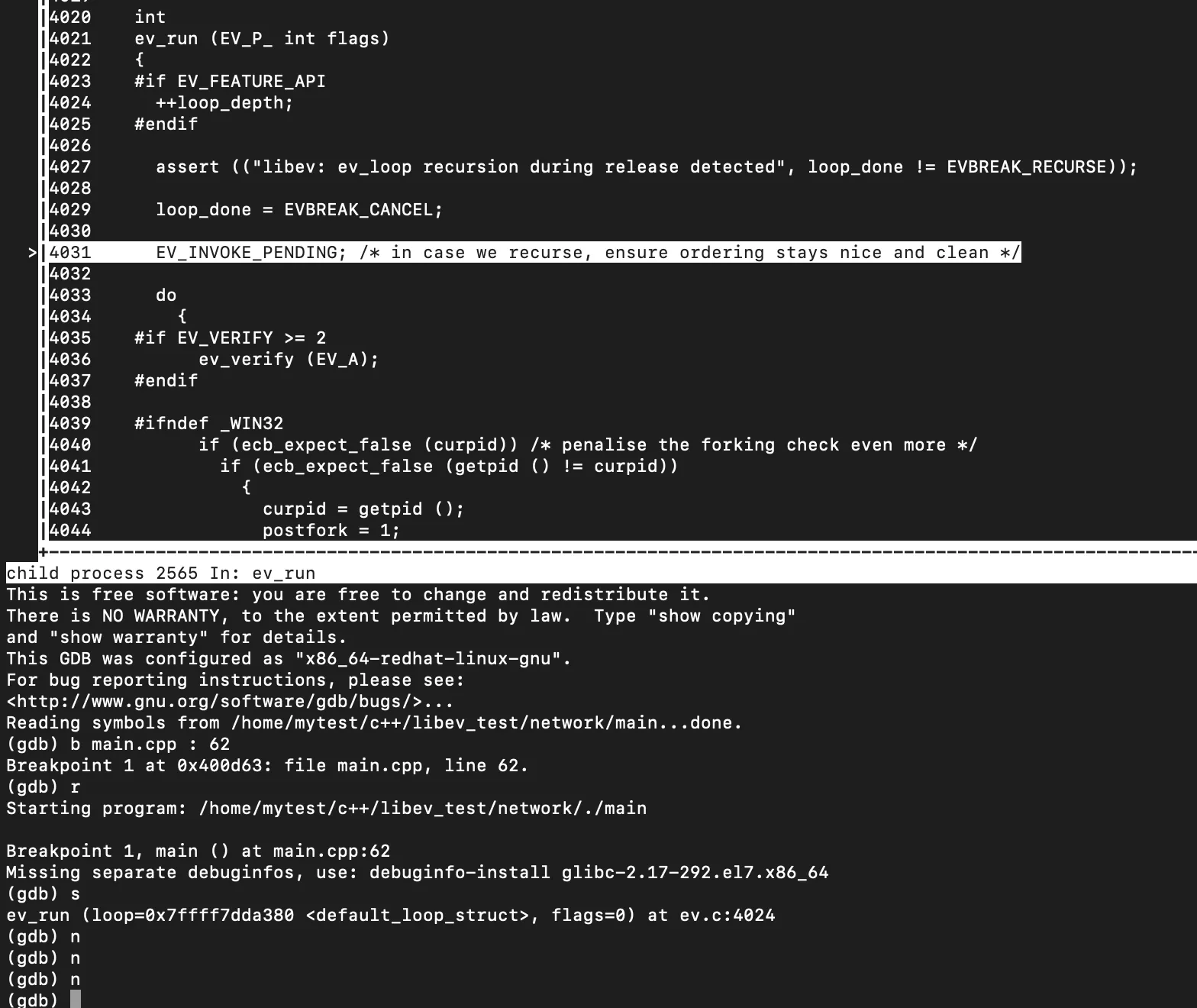理解 libev 工作流程,官方文档 和网上有很多资料可以查阅(事件库之Libev(一),随笔分类 - libev)。
libev 源码,宏的使用频率比较高,也因为这样,源码理解起来比较费脑,可以展开宏查阅源码,或者通过调试方式,理解 libev 的工作流程。
redis-ae 事件管理与 libev 有点类似,也可以相互比较一下。
1. 展开宏
程序编译流程:预编译,编译,汇编器,链接。
预编译阶段,还没涉及程序语义解析,可以将文件的宏进行展开。
libev 核心逻辑在 ev.c 文件,对这个文件进行预编译(其它文件也可以参考这个方法)。
1
gcc -E ev.c -o ev.i
- 宏展开前
1
2
3
4
5
6
7
8
9
10
11
12
13
14
15
16
17
18
19
20
21
22
23
24
// ev.c
void noinline
ev_timer_start (EV_P_ ev_timer *w) EV_THROW
{
if (expect_false (ev_is_active (w)))
return;
ev_at (w) += mn_now;
assert (("libev: ev_timer_start called with negative timer repeat value", w->repeat >= 0.));
EV_FREQUENT_CHECK;
++timercnt;
ev_start (EV_A_ (W)w, timercnt + HEAP0 - 1);
array_needsize (ANHE, timers, timermax, ev_active (w) + 1, EMPTY2);
ANHE_w (timers [ev_active (w)]) = (WT)w;
ANHE_at_cache (timers [ev_active (w)]);
upheap (timers, ev_active (w));
EV_FREQUENT_CHECK;
/*assert (("libev: internal timer heap corruption", timers [ev_active (w)] == (WT)w));*/
}
- 宏展开后
1
2
3
4
5
6
7
8
9
10
11
12
13
14
15
16
17
18
19
20
// ev.i
void __attribute__ ((__noinline__))
ev_timer_start (struct ev_loop *loop, ev_timer *w)
{
if (__builtin_expect ((!!((0 + ((ev_watcher *)(void *)(w))->active))),(0)))
return;
((WT)(w))->at += ((loop)->mn_now);
...
do { } while (0);
++((loop)->timercnt);
ev_start (loop, (W)w, ((loop)->timercnt) + (4 - 1) - 1);
if (__builtin_expect ((!!((((W)(w))->active + 1) > (((loop)->timermax)))),(0))) { int __attribute__ ((__unused__)) ocur_ = (((loop)->timermax)); (((loop)->timers)) = (ANHE *)array_realloc (sizeof (ANHE), (((loop)->timers)), &(((loop)->timermax)), (((W)(w))->active + 1)); ; };
(((loop)->timers) [((W)(w))->active]).w = (WT)w;
(((loop)->timers) [((W)(w))->active]).at = (((loop)->timers) [((W)(w))->active]).w->at;
upheap (((loop)->timers), ((W)(w))->active);
do { } while (0);
}
2. gdb 调试
- 下载 libev 源码:源码地址
地址如果打不开,可能被墙了。
- 修改源码目录下的 configure 文件,将所有编译优化项(CFLAGS),修改为
CFLAGS="-g O0"。 - 编译安装源码:
./configure && make && make install - gdb 调试测试源码。
详细请参考:gdb & libev 调试视频

3. 对比 redis-ae
redis 事件管理 aeEventLoop 与 libev 类似。总体来说,libev 要比 redis 功能丰富实用,redis 不用 libev,可能 redis 作者希望源码更可控。
- libev 处理事件类型更丰富,aeEventLoop 只处理了文件事件和时钟事件。
- redis aeEventLoop 有
beforesleep和aftersleep等操作处理。
1
2
3
4
5
6
7
8
void aeMain(aeEventLoop *eventLoop) {
eventLoop->stop = 0;
while (!eventLoop->stop) {
if (eventLoop->beforesleep != NULL)
eventLoop->beforesleep(eventLoop);
aeProcessEvents(eventLoop, AE_ALL_EVENTS|AE_CALL_AFTER_SLEEP);
}
}
- libev 很多源码细节做得更好,例如:
- 时钟,redis 用的是列表存储(不优化的原因,目前时钟事件并不多,暂时没有改进的必要),而 libev 用数组存储时钟事件,通过堆排序,过期策略做得非常高效。
- 例如 epoll_ctl 出现重复插入事件错误(EEXIST),libev 会主动进行修改 EPOLL_CTL_MOD。而 redis 这种场景,就直接返回错误,让用户处理了。
1
2
3
4
5
6
7
8
9
10
11
12
13
14
15
16
17
18
19
20
21
22
23
24
25
26
27
28
29
30
31
32
33
34
35
36
37
// libev - ev_epoll.c
static void epoll_modify (EV_P_ int fd, int oev, int nev) {
...
if (expect_true (!epoll_ctl (backend_fd, oev && oldmask != nev ? EPOLL_CTL_MOD : EPOLL_CTL_ADD, fd, &ev)))
return;
...
// 错误处理。
else if (expect_true (errno == EEXIST))
{
/* EEXIST means we ignored a previous DEL, but the fd is still active */
/* if the kernel mask is the same as the new mask, we assume it hasn't changed */
if (oldmask == nev)
goto dec_egen;
if (!epoll_ctl (backend_fd, EPOLL_CTL_MOD, fd, &ev))
return;
}
...
}
// redis - ep_epoll.c
static int aeApiAddEvent(aeEventLoop *eventLoop, int fd, int mask) {
aeApiState *state = eventLoop->apidata;
struct epoll_event ee = {0}; /* avoid valgrind warning */
/* If the fd was already monitored for some event, we need a MOD
* operation. Otherwise we need an ADD operation. */
int op = eventLoop->events[fd].mask == AE_NONE ?
EPOLL_CTL_ADD : EPOLL_CTL_MOD;
ee.events = 0;
mask |= eventLoop->events[fd].mask; /* Merge old events */
if (mask & AE_READABLE) ee.events |= EPOLLIN;
if (mask & AE_WRITABLE) ee.events |= EPOLLOUT;
ee.data.fd = fd;
if (epoll_ctl(state->epfd,op,fd,&ee) == -1) return -1;
return 0;
}


